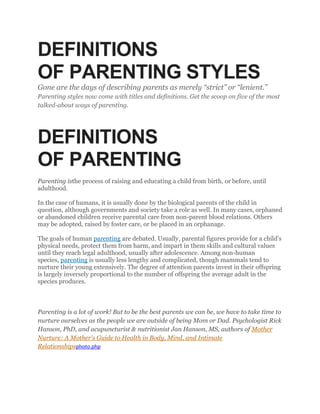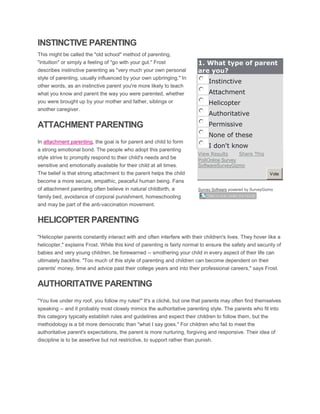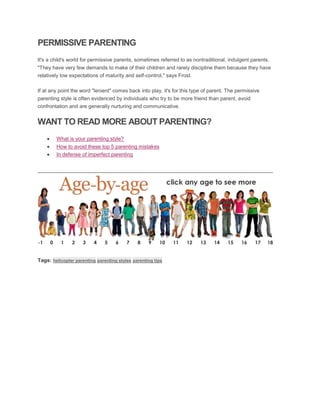Parenting styles
- 1. DEFINITIONS OF PARENTING STYLES Gone are the days of describing parents as merely “strict” or “lenient.” Parenting styles now come with titles and definitions. Get the scoop on five of the most talked-about ways of parenting. DEFINITIONS OF PARENTING Parenting isthe process of raising and educating a child from birth, or before, until adulthood. In the case of humans, it is usually done by the biological parents of the child in question, although governments and society take a role as well. In many cases, orphaned or abandoned children receive parental care from non-parent blood relations. Others may be adopted, raised by foster care, or be placed in an orphanage. The goals of human parenting are debated. Usually, parental figures provide for a child's physical needs, protect them from harm, and impart in them skills and cultural values until they reach legal adulthood, usually after adolescence. Among non-human species, parenting is usually less lengthy and complicated, though mammals tend to nurture their young extensively. The degree of attention parents invest in their offspring is largely inversely proportional to the number of offspring the average adult in the species produces. Parenting is a lot of work! But to be the best parents we can be, we have to take time to nurture ourselves as the people we are outside of being Mom or Dad. Psychologist Rick Hanson, PhD, and acupuncturist & nutritionist Jan Hanson, MS, authors of Mother Nurture: A Mother's Guide to Health in Body, Mind, and Intimate Relationshipsphoto.php
- 4. PARENTING STYLES Gone are the days of describing parents as merely “strict” or “lenient.” Parenting styles now come with titles and definitions. Get the scoop on five of the most talked-about ways of parenting. The rules for parenting are known to shift generation by generation. "Not having a strong sense of who you are and how you want to parent can make you a little crazy," says Tracey Frost, CEO of Citibabes, an educational family membership club in New York City. "Be as educated as you can and then make your own decisions [about your parenting style]." Following are five of the most common parenting styles that today's moms and dads are applying to their families.
- 5. INSTINCTIVE PARENTING This might be called the "old school" method of parenting, "intuition" or simply a feeling of "go with your gut." Frost describes instinctive parenting as "very much your own personal style of parenting, usually influenced by your own upbringing." In other words, as an instinctive parent you're more likely to teach what you know and parent the way you were parented, whether you were brought up by your mother and father, siblings or another caregiver. ATTACHMENT PARENTING In attachment parenting, the goal is for parent and child to form a strong emotional bond. The people who adopt this parenting style strive to promptly respond to their child's needs and be sensitive and emotionally available for their child at all times. The belief is that strong attachment to the parent helps the child become a more secure, empathic, peaceful human being. Fans of attachment parenting often believe in natural childbirth, a family bed, avoidance of corporal punishment, homeschooling and may be part of the anti-vaccination movement. HELICOPTER PARENTING "Helicopter parents constantly interact with and often interfere with their children's lives. They hover like a helicopter," explains Frost. While this kind of parenting is fairly normal to ensure the safety and security of babies and very young children, be forewarned -- smothering your child in every aspect of their life can ultimately backfire. "Too much of this style of parenting and children can become dependent on their parents' money, time and advice past their college years and into their professional careers," says Frost. AUTHORITATIVE PARENTING "You live under my roof, you follow my rules!" It's a cliché, but one that parents may often find themselves speaking -- and it probably most closely mimics the authoritative parenting style. The parents who fit into this category typically establish rules and guidelines and expect their children to follow them, but the methodology is a bit more democratic than "what I say goes." For children who fail to meet the authoritative parent's expectations, the parent is more nurturing, forgiving and responsive. Their idea of discipline is to be assertive but not restrictive, to support rather than punish. 1. What type of parent are you? Instinctive Attachment Helicopter Authoritative Permissive None of these I don't know View Results Share This PollOnline Survey SoftwareSurveyGizmo Vote Survey Software powered by SurveyGizmo
- 6. PERMISSIVE PARENTING It's a child's world for permissive parents, sometimes referred to as nontraditional, indulgent parents. "They have very few demands to make of their children and rarely discipline them because they have relatively low expectations of maturity and self-control," says Frost. If at any point the word "lenient" comes back into play, it's for this type of parent. The permissive parenting style is often evidenced by individuals who try to be more friend than parent, avoid confrontation and are generally nurturing and communicative. WANT TO READ MORE ABOUT PARENTING? What is your parenting style? How to avoid these top 5 parenting mistakes In defense of imperfect parenting Tags: helicopter parenting parenting styles parenting tips
- 7. WHAT TYPE OF PARENT ARE YOU? All parents have one thing in common: we love our kids beyond measure and we ultimately want what's best for them. Of course, we all have different ideas of what constitutes good parenting - which is why nothing stirs up a conversation quite like discussions to do with child rearing! From choices to do with how our kids should behave and how they should be disciplined, to discussing the pros and cons of organic nappies, we make parenting decisions each and every single day that reflect our parenting style. Psychologists have long studied the links between different parenting styles and the impact they can have on children. So what do your parenting decisions say about you — and which of the following categories do you most closely identify with?
- 8. Authoritarian Parenting As the title suggests, this style of parenting is all about respecting those in a position of authority, such as your parents. These are the parents who, when questioned, will offer no explanation behind their decision. When they tell their child to go to bed, for instance, and their child whines, "Why do I have to go to bed at 7 oclock? It's early!" an Authoritarian parent will simply reply, "Because I said so." Under this regime, children are expected to follow the rules — or else. The result? This style of parenting leads to obedient children, but they're usually less spontaneous and curious — and they often rank lower in the areas of happiness, social skills and self-esteem. Authoritative Parenting Authoritative parents, also called 'balanced' parents, establish rules and guidelines, and children are expected to follow along. However, these parents are usually more responsive to their kids and more willing to listen to questions and negotiate. They are distinct from Authoritarian mums and dads as they're more forgiving and nurturing, particularly when their children fail to follow the rules or meet their expectations. The result? Children of Authoritative parents are the happiest, most capable and successful of the bunch! Indulgent Parenting Remember when you were a teenager, and your friend's mum was just so cool? She'd let you throw parties or stay out really late, and felt more like a big sister than a parental figure? These folks are known as Indulgent parents — also referred to as Permissive parents — as they make very few demands of their children. They have low expectations of maturity, they're impossibly lenient and they generally prefer to avoid confrontation at all costs. Indulgent parents often take on the role of a "friend" rather than that of a parent, and they're very nurturing.
- 9. The result? Children of permissive parents are impulsive. As a result, they're associated with riskier behaviours as teenagers, such as misconduct and drug use. These kids are less likely to respect authority and often perform poorly in school. Uninvolved Parenting An Uninvolved or Negligent parenting style is exactly what is sounds like – the parent is involved minimally in their child's life. The parent has few demands and communicates poorly with their kids, and while they fulfill basic needs — such as food, shelter, warmth and clothes — they're generally fairly detached from their child's life. The result? Uninvolved parents produce children who lack self-control, have low self-esteem and are generally less competent and confident than their peers. Tags: parenting style parenting tips
- 10. LEARN TO SAY, "I WAS WRONG" Father knows best, and mom is always right, right? Well, not really. And you can actually teach your kids a critical lesson if you learn to admit your mistakes. Your daughter brings home a history test with a terrible grade. You're furious, and while you're telling her about the new no-TV rule you're instituting, she's texting her friend. In a rage, you grab the cell phone and stomp your foot on it, smashing it beyond repair. Overreaction? Um, yeah -- but knowing that doesn't exactly help you now. And you're actually in good company -- the chairman of the public education committee of the American Academy of Pediatricsknows your pain. It's what you do next that matters most. Step away from the situation When you've reached your boiling point, don't even try to behave rationally. Tell your child, "I'm too angry to handle this properly. Let's deal with this in 15 minutes." The time limit is important, because it lets both of you know what to expect. You can begin to expel the rage from your body, and your daughter isn't walking around waiting for a death sentence for hours or
- 11. days. Do what you need to do to get to a calm state -- call a friend, post to your blog, or throw darts at your daughter's picture if that's what it takes, but get it out of you. Then it's time to face the music -- for both of you. Sorry seems to be the hardest word When you sit down with your child, the first words out of your mouth need to be an unequivocal apology. "I'm sorry; I was wrong to smash your cellphone." Let that sink in, and do not make excuses for your behavior. You wouldn't accept those excuses from anyone else, and your child deserves the same respect you give yourself. Most teens will be surprised by an apology from a parent, and they might sit in silence. If, however, your teen comes back guns blazing, "Of course you were wrong! Are you crazy? I'm calling CPS!" you need to bite your tongue and hold up your hand to stop the tirade. Smashing a cell phone, despite what your teen may think, does not constitute child abuse. At any rate, now we move on to the discussion of your child's transgression. "I was very angry, and I acted inappropriately, and I'm sorry. We'll deal with that soon. But first, we need to talk about why I was angry. That grade tells me you didn't bother to study for this test, and that's going to change." Be very careful here, because you'll be tempted to fall into familiar speech patterns that excuse your behavior, which you're not trying to do. The idea is, "I was wrong, and you were wrong -- but your being wrong doesn't excuse my being wrong." So it's not, "I'm sorry I broke your phone, but you made me so angry!" It's, "I'm sorry I broke your phone. I shouldn't have done that. Now, we need to talk about this test." Sorry for the small things Sometimes our parenting mistakes aren't so dramatic. You send your son to time out and then discover that he's not the one who made the mess or broke the plate or whatever. Go to his room and apologize. "I'm sorry. I was wrong." These are powerful words for a child to hear. Think about the message you're passing on: "People make mistakes. Even I, your parent, can be wrong. And when I am, I take responsibility for it, and the world continues to turn on its axis." By admitting your own errors, you give your child the strength he needs to admit his, today and tomorrow. Parenting is a lot of work! But to be the best parents we can be, we have to take time to nurture ourselves as the people we are outside of being Mom or Dad. Psychologist Rick Hanson, PhD, and acupuncturist & nutritionist Jan Hanson, MS, authors of Mother Nurture: A Mother's Guide to Health in Body, Mind, and Intimate Relationships, are here to help!
- 12. Rick Hanson, PhD, and Jan Hanson, MS Your question: Sometimes I get so mad at my kids! Yes, they were misbehaving but I feel bad about getting angry with them. Rick and Jan Hanson answer: Children stir up powerful feelings, including anger, and you are not alone in getting mad. Nonetheless, adult anger is very scary for little children, and it can start a parent down the slippery slope of emotional or even physical abuse. Plus it's a kind of affliction upon the parent herself: it feels terrible and makes us feel guilty. So here's what you can do: Accept your feelings -- Anger is normal. Take the middle path between the two pitfalls of suppressing anger or just dumping it on your kids by allowing yourself to feel your anger but also contain it appropriately. Lower your stress -- Our own stress or depletion can easily spill over onto the kids, so take steps to handle these factors. It's a fact that our book -- Mother Nurture: A Mother's Guide to Health in Body, Mind, and Intimate Relationships-- is the best resource on the market for this, and we highly recommend it! Understand yourself --By understanding your anger you can insert self-control into processes that are currently unconscious and automatic. Notice what especially triggers your anger; there's a good chance there is something there rooted in your own childhood, or in your relationship with your partner, or in your feelings about your overall situation. Relax your body -- It's nearly impossible to be seriously upset when the body is relaxed. Take some big breaths, leave the situation for a moment if you can, splash some soothing warm water on your face, imagine standing in a fresh stream of water that washes the angry feelings away, etc.
- 13. Do NOT act inappropriately -- Imagine a video camera is recording your behavior and others will see it. Remember how you felt as a child if your parents yelled at or hit you. Remember the precious being inside your child, so vulnerable and sweet. Remember that young children cannot control themselves very well, that it's not their fault they're tantrumming or misbehaving, that they are too young to be manipulative. Imagine yourself in an angry situation and visualize handling it calmly and well. NEVER hit or scream at or insult a child in anger. Criticize the behavior, not the person. Prevent angry encounters in the first place --There is a predictable quality to many angry interactions. So explain early on to your kids what is coming and what you want them to do. Be organized yourself. Choose your battles wisely and don't struggle over little things. Pay attention to food and rest (your own as well!). Separate siblings that are guaranteed to squabble. Pouring loving energy into your children (hard when you're already exhausted) can make them less stressful and draining to manage in the future. Be credible in your parental power. Do not make threats you don't fulfill. For example, if your kids know that you won't tolerate ridiculous squabbling, they will be less likely to do it in the first place. Intervene early and decisively --Step in quickly in escalating interactions. Often one sees relatively feeble efforts at parental control building up to an explosive crescendo. If you do not exceed the necessary threshold to get your children to act appropriately, your intervention will make little difference. Study the situation a moment before you react, and then be calm, clear, and sufficiently powerful. Have reality be the consequence, not you -- Create reasonable, age-appropriate rewards and penalties for child behavior. 90 percent of the time that will do the trick -- if not, consult with your pediatrician, a therapist, or a parent educator. If you feel like you've got a system that will regulate child misbehavior, you won't feel so frustrated and helpless: fertile breeding ground for anger. Focus on love and kindness -- It sounds like a clich?, but it's actually profound: Love is largely a matter of the will: we can choose to be loving. And that both puts us in a calmer, clearer, less irritable place and tends to elicit more cooperation from our children. Win-win!




![PARENTING STYLES
Gone are the days of describing parents as merely “strict” or “lenient.”
Parenting styles now come with titles and definitions. Get the scoop on five of the most
talked-about ways of parenting.
The rules for parenting are known to shift generation by generation. "Not having a strong sense of who
you are and how you want to parent can make you a little crazy," says Tracey Frost, CEO of Citibabes, an
educational family membership club in New York City. "Be as educated as you can and then make your
own decisions [about your parenting style]."
Following are five of the most common parenting styles that today's moms and dads are applying to their
families.](https://image.slidesharecdn.com/parentingstyles-130425130320-phpapp02/85/Parenting-styles-4-320.jpg)









